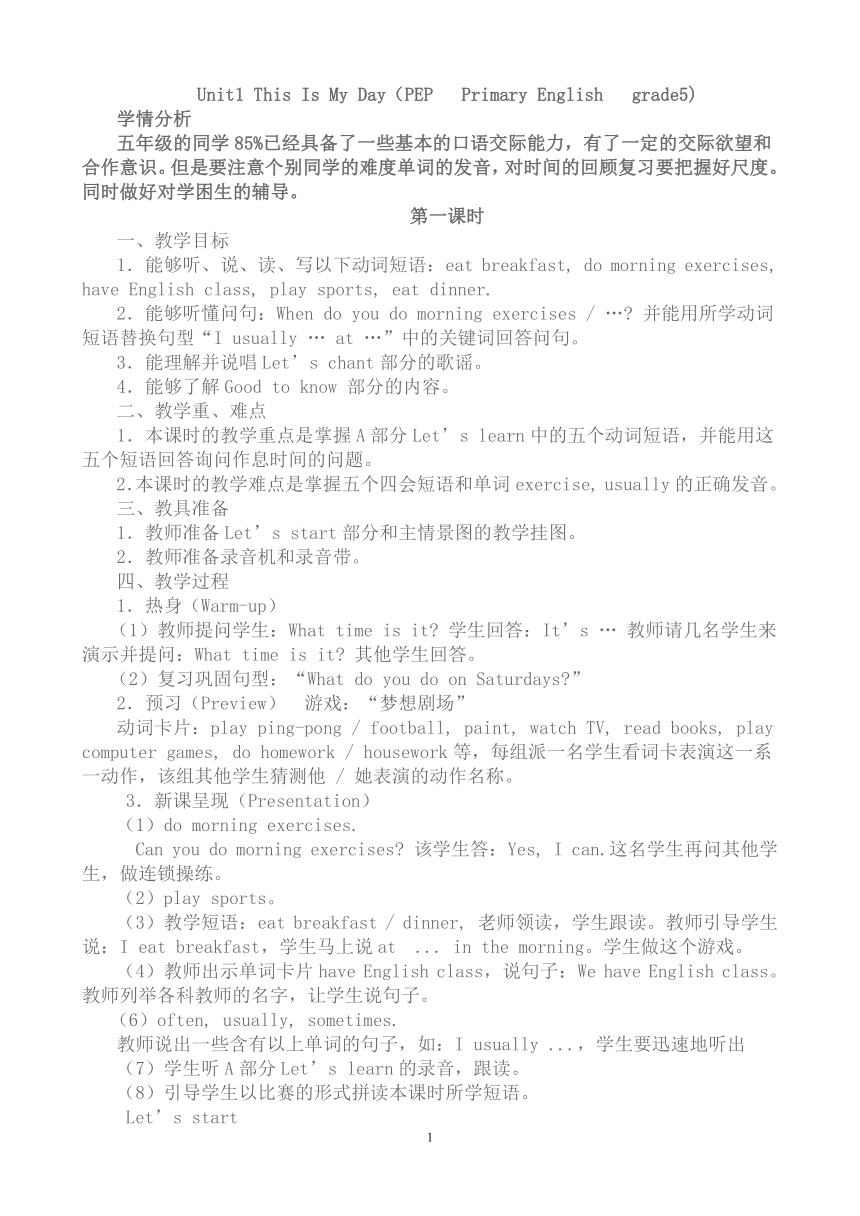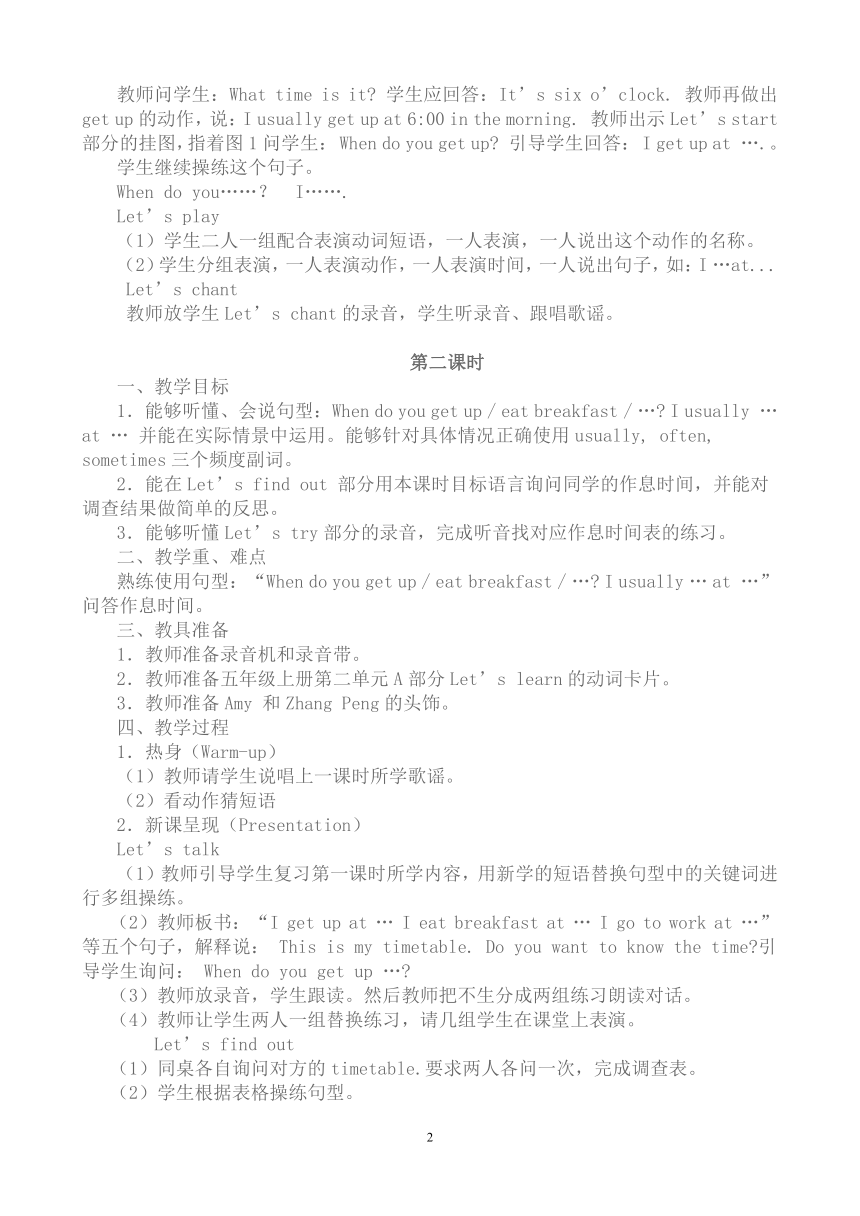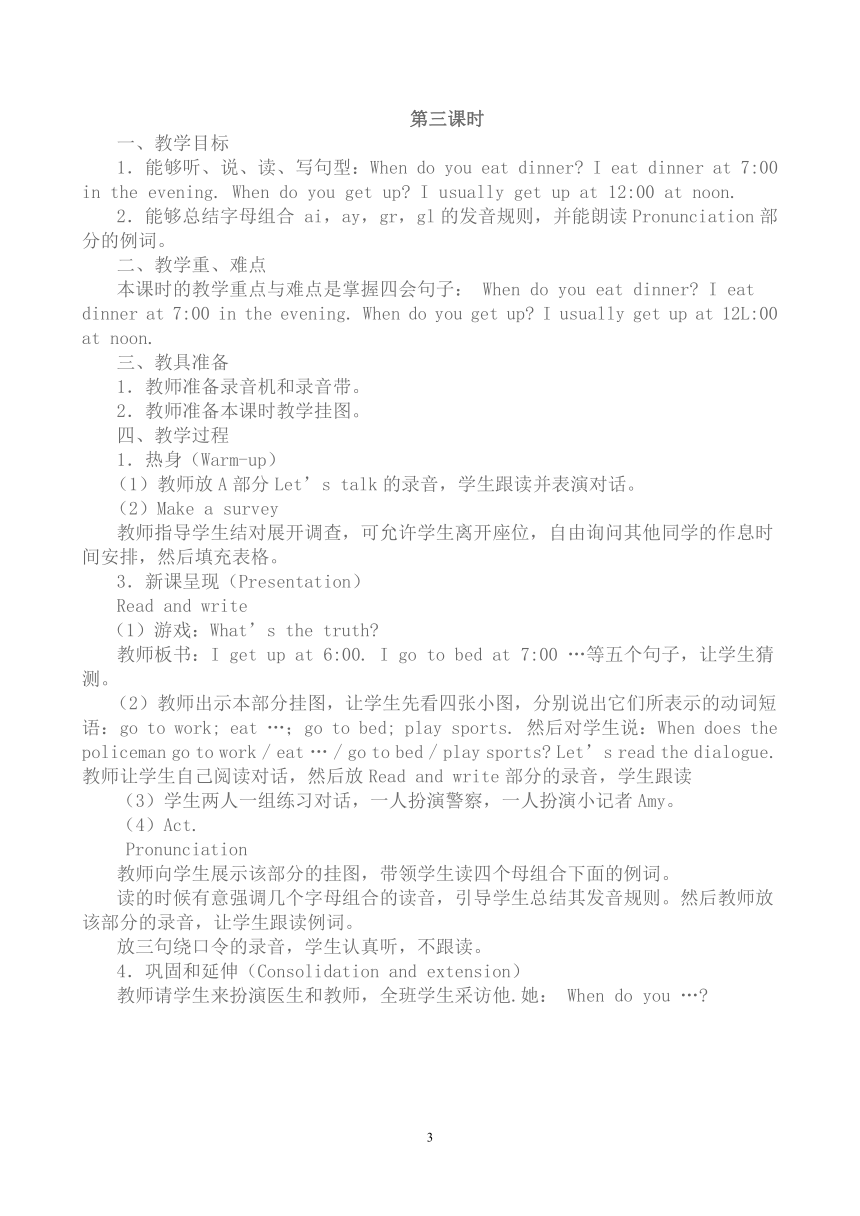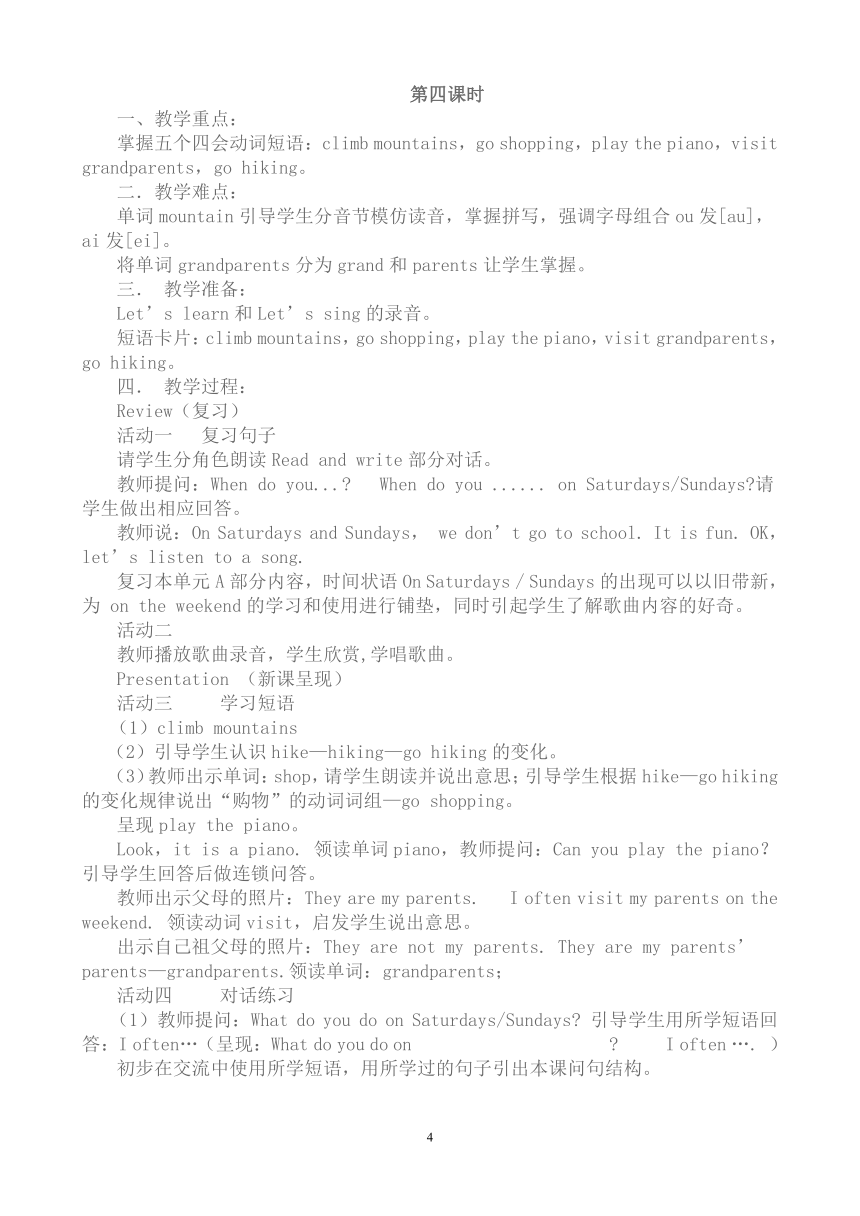unit1 this is my day
文档属性
| 名称 | unit1 this is my day |

|
|
| 格式 | zip | ||
| 文件大小 | 13.3KB | ||
| 资源类型 | 教案 | ||
| 版本资源 | 人教版(PEP) | ||
| 科目 | 英语 | ||
| 更新时间 | 2011-03-15 00:00:00 | ||
图片预览




文档简介
Unit1 This Is My Day(PEP Primary English grade5)
学情分析
五年级的同学85%已经具备了一些基本的口语交际能力,有了一定的交际欲望和合作意识。但是要注意个别同学的难度单词的发音,对时间的回顾复习要把握好尺度。同时做好对学困生的辅导。
第一课时
一、教学目标
1.能够听、说、读、写以下动词短语:eat breakfast, do morning exercises, have English class, play sports, eat dinner.
2.能够听懂问句:When do you do morning exercises / … 并能用所学动词短语替换句型“I usually … at …”中的关键词回答问句。
3.能理解并说唱Let’s chant部分的歌谣。
4.能够了解Good to know 部分的内容。
二、教学重、难点
1.本课时的教学重点是掌握A部分Let’s learn中的五个动词短语,并能用这五个短语回答询问作息时间的问题。
2.本课时的教学难点是掌握五个四会短语和单词exercise, usually的正确发音。
三、教具准备
1.教师准备Let’s start部分和主情景图的教学挂图。
2.教师准备录音机和录音带。
四、教学过程
1.热身(Warm-up)
(1)教师提问学生:What time is it 学生回答:It’s … 教师请几名学生来演示并提问:What time is it 其他学生回答。
(2)复习巩固句型:“What do you do on Saturdays ”
2.预习(Preview) 游戏:“梦想剧场”
动词卡片:play ping-pong / football, paint, watch TV, read books, play computer games, do homework / housework等,每组派一名学生看词卡表演这一系一动作,该组其他学生猜测他 / 她表演的动作名称。
3.新课呈现(Presentation)
(1)do morning exercises.
Can you do morning exercises 该学生答:Yes, I can.这名学生再问其他学生,做连锁操练。
(2)play sports。
(3)教学短语:eat breakfast / dinner, 老师领读,学生跟读。教师引导学生说:I eat breakfast,学生马上说at ... in the morning。学生做这个游戏。
(4)教师出示单词卡片have English class,说句子:We have English class。教师列举各科教师的名字,让学生说句子。
(6)often, usually, sometimes.
教师说出一些含有以上单词的句子,如:I usually ...,学生要迅速地听出
(7)学生听A部分Let’s learn的录音,跟读。
(8)引导学生以比赛的形式拼读本课时所学短语。
Let’s start
教师问学生:What time is it 学生应回答:It’s six o’clock. 教师再做出get up的动作,说:I usually get up at 6:00 in the morning. 教师出示Let’s start部分的挂图,指着图1问学生: When do you get up 引导学生回答: I get up at ….。
学生继续操练这个句子。
When do you……? I…….
Let’s play
(1)学生二人一组配合表演动词短语,一人表演,一人说出这个动作的名称。
(2)学生分组表演,一人表演动作,一人表演时间,一人说出句子,如:I …at...
Let’s chant
教师放学生Let’s chant的录音,学生听录音、跟唱歌谣。
第二课时
一、教学目标
1.能够听懂、会说句型:When do you get up / eat breakfast / … I usually … at … 并能在实际情景中运用。能够针对具体情况正确使用usually, often, sometimes三个频度副词。
2.能在Let’s find out 部分用本课时目标语言询问同学的作息时间,并能对调查结果做简单的反思。
3.能够听懂Let’s try部分的录音,完成听音找对应作息时间表的练习。
二、教学重、难点
熟练使用句型:“When do you get up / eat breakfast / … I usually … at …”问答作息时间。
三、教具准备
1.教师准备录音机和录音带。
2.教师准备五年级上册第二单元A部分Let’s learn的动词卡片。
3.教师准备Amy 和Zhang Peng的头饰。
四、教学过程
1.热身(Warm-up)
(1)教师请学生说唱上一课时所学歌谣。
(2)看动作猜短语
2.新课呈现(Presentation)
Let’s talk
(1)教师引导学生复习第一课时所学内容,用新学的短语替换句型中的关键词进行多组操练。
(2)教师板书:“I get up at … I eat breakfast at … I go to work at …”等五个句子,解释说: This is my timetable. Do you want to know the time 引导学生询问: When do you get up …
(3)教师放录音,学生跟读。然后教师把不生分成两组练习朗读对话。
(4)教师让学生两人一组替换练习,请几组学生在课堂上表演。
Let’s find out
(1)同桌各自询问对方的timetable.要求两人各问一次,完成调查表。
(2)学生根据表格操练句型。
第三课时
一、教学目标
1.能够听、说、读、写句型:When do you eat dinner I eat dinner at 7:00 in the evening. When do you get up I usually get up at 12:00 at noon.
2.能够总结字母组合 ai,ay,gr,gl的发音规则,并能朗读Pronunciation部分的例词。
二、教学重、难点
本课时的教学重点与难点是掌握四会句子: When do you eat dinner I eat dinner at 7:00 in the evening. When do you get up I usually get up at 12L:00 at noon.
三、教具准备
1.教师准备录音机和录音带。
2.教师准备本课时教学挂图。
四、教学过程
1.热身(Warm-up)
(1)教师放A部分Let’s talk的录音,学生跟读并表演对话。
(2)Make a survey
教师指导学生结对展开调查,可允许学生离开座位,自由询问其他同学的作息时间安排,然后填充表格。
3.新课呈现(Presentation)
Read and write
(1)游戏:What’s the truth
教师板书:I get up at 6:00. I go to bed at 7:00 …等五个句子,让学生猜测。
(2)教师出示本部分挂图,让学生先看四张小图,分别说出它们所表示的动词短语:go to work; eat …;go to bed; play sports. 然后对学生说:When does the policeman go to work / eat … / go to bed / play sports Let’s read the dialogue. 教师让学生自己阅读对话,然后放Read and write部分的录音,学生跟读
(3)学生两人一组练习对话,一人扮演警察,一人扮演小记者Amy。
(4)Act.
Pronunciation
教师向学生展示该部分的挂图,带领学生读四个母组合下面的例词。
读的时候有意强调几个字母组合的读音,引导学生总结其发音规则。然后教师放该部分的录音,让学生跟读例词。
放三句绕口令的录音,学生认真听,不跟读。
4.巩固和延伸(Consolidation and extension)
教师请学生来扮演医生和教师,全班学生采访他.她: When do you …
第四课时
一、教学重点:
掌握五个四会动词短语:climb mountains,go shopping,play the piano,visit grandparents,go hiking。
二.教学难点:
单词mountain引导学生分音节模仿读音,掌握拼写,强调字母组合ou发[au],ai发[ei]。
将单词grandparents分为grand和parents让学生掌握。
三. 教学准备:
Let’s learn和Let’s sing的录音。
短语卡片:climb mountains,go shopping,play the piano,visit grandparents,go hiking。
四. 教学过程:
Review(复习)
活动一 复习句子
请学生分角色朗读Read and write部分对话。
教师提问:When do you... When do you ...... on Saturdays/Sundays 请学生做出相应回答。
教师说:On Saturdays and Sundays, we don’t go to school. It is fun. OK,let’s listen to a song.
复习本单元A部分内容,时间状语On Saturdays / Sundays的出现可以以旧带新,为 on the weekend的学习和使用进行铺垫,同时引起学生了解歌曲内容的好奇。
活动二
教师播放歌曲录音,学生欣赏,学唱歌曲。
Presentation (新课呈现)
活动三 学习短语
(1)climb mountains
(2)引导学生认识hike—hiking—go hiking的变化。
(3)教师出示单词:shop,请学生朗读并说出意思;引导学生根据hike—go hiking的变化规律说出“购物”的动词词组—go shopping。
呈现play the piano。
Look,it is a piano. 领读单词piano,教师提问:Can you play the piano?引导学生回答后做连锁问答。
教师出示父母的照片:They are my parents. I often visit my parents on the weekend. 领读动词visit,启发学生说出意思。
出示自己祖父母的照片:They are not my parents. They are my parents’ parents—grandparents.领读单词:grandparents;
活动四 对话练习
(1)教师提问:What do you do on Saturdays/Sundays 引导学生用所学短语回答:I often…(呈现:What do you do on I often …. )
初步在交流中使用所学短语,用所学过的句子引出本课问句结构。
教师说: What do you do on the weekend (在上面的问句后补充the weekend) Let’s listen. 播放Let’s learn的对话录音,出示所学的五个动词短语卡片,学生听后找出对话中出现的短语:go shopping,go hiking。
通过听对话选短语的练习巩固学生对短语的发音和认读的掌握
(3)播放对话录音学生跟读。
(4)学生两人一组练习对话,可用不同短语进行替换。
5、Let’s play
活动五 找朋友
教师播放Let’s learn部分的词组,学生跟读。
活动六 说唱歌谣
(1)教师播放P7chant部分的课件,学生欣赏。
(2)跟录音拍手说唱。
Consolidation and extension 巩固与扩展
活动七 练一练
读短语:climb mountains,go shopping,play the piano,visit grandparents,go hiking。
教师提问:What do you do on the weekend?学生回答:I often……
第五课时
教学重点:
熟练使用句型What do you do on the weekend I usually / often… Sometimes I….谈论周末活动。
教学难点:
对三个频度幅词的准确使用;句型Let’s … together ….的认读和适时使用。
教学准备:
录音材料:Let’s try;Let’s talk。
教学过程:
Warm up (热身)
活动一 说唱歌谣
教师播放P2歌谣,学生一起拍手说唱。
教师出示词组:go shopping,go hiking, visit grandparents, play the piano, climb mountains, read books, do homework, watch TV, clean my room, 学生认读。
Review(复习)
活动二 谈论周末
教师提问:What do you do on the weekend?启发同学用usually, often和sometimes说说自己的周末安排。
通过回答问题巩固问句的功能,初步运用频度副词表达自己的周末活动,为Let’s try部分的完成做好准备。
活动三 听力练习
教师出示Let’s try 中的内容,请学生自己朗读词组。
播放Let’s try部分录音,学生根据听到的内容写出人名。
让学生对Let’s talk中的新句子进行初步感知。
Presentation (新课呈现)
活动四 角色扮演
教师呈现Let’s try 的挂图,请两名学生分别扮演Zhang Peng和Mike,引导其他同学用What do you do on the weekend?提问他们的周末活动,这两名同学要根据挂图内容做出相应回答。
引导学生用What do you do on the weekend?询问教师的周末安排,然后教师分别用usually often sometimes谈论自己的周末活动:I usually / often … ;Usually I …;Sometimes I …; I sometimes…
学生自由操练,学会副词的应用。
教师说:What do Chen Jie and John do on the weekend?
播放录音2遍,学生边听边完成练习:Listen and tick
再次放录音,讲解练习答案,了解学生的完成情况。
教师指着上面完成后的表格说:John sometimes goes hiking. Chen Jie often goes hiking. What does John say
呈现句子:Let’s go together next Sunday. 请学生认读,教师提示意思。
学生跟录音读对话。
两人一组分角色朗读对话,鼓励学生根据自己的实际生活进行替换。
Let’s play (趣味操练)
学生以组为单位根据所给单词写出排列好的句子。
活动七 找伙伴
学生四人一组,互相询问:What do you do on the weekend?要问到同组的每一个成员,找到可以在一起度周末的伙伴。
完成填空: I usually _________ on the weekend. Sometimes I _____________ . I can _________ with _____________ . I can _________ with _____________ .
让学生在交流中进一步应用语言,并通过书写及时巩固。
第六课时
教学重点:
掌握四会句子:What do you do on the weekend Usually I watch TV and go shopping. Sometimes I visit my grandparents. I often play football. Sometimes I go shopping.
教学难点:
句子The weather report says it’s going to rain tomorrow. I can’t play football in the rain. I can’t go hiking, either.的理解和应用。
教学准备:
录音:Read and write部分;Let’s check部分。
Read and write部分挂图。
教学过程:
Warm –up (热身)
活动一 说唱活动
教师播放本单元歌曲歌谣录音,学生说唱。
活动二 游戏, 接龙问答
同一组学生占成一排,做传递问题的游戏。
A: What do you do on the weekend
B: I often go shopping. What do you do on the weekend
C: I usually ......
在游戏中应用部分语句进行交流。
Presentation (新课呈现)
活动三 学习对话
教师出示Read and write对话的挂图,提问学生:These are Zip’s weekend activities. Those are Zoom’s weekend activities. Look at the pictures carefully. What can they do on the weekend 引导学生看图回答:Zip can ... Zoom can ...
学生初步了解对话内容,在描述中培养学生的语言运用能力。
(2)教师让学生自己阅读本部分对话。
(3)教师帮助学生理解句子:“The weather report says it’s going to rain tomorrow. I can’t play football in the rain. I can’t go hiking, either. Let’s watch TV together.”
出示图片:1) 晴天,Zoom在踢足球,图下显示:today; 2)天在下雨,Zoom和Zip在屋里看电视。
与学生展开对话
T:What’s the weather like today
S:It’s fine/ sunny.
T:What does the weather report say about tomorrow?
S:It’s going to rain.
T:The weather report says it’s going to rain tomorrow. (呈现句子)
(学生重复句子The weather report says it’s going to rain tomorrow.,并说出意思。)
T:Can you play football in the rain?
S:No,I can’t.
T:Can you go hiking ?
S:No,I can’t.
T:In the rain, we can’t play football. We can’t go hiking, either. (呈现:either)
学生跟读either,感悟单词的用法,教师讲解意思:(不......),也不...
启发学生用either说两句话:In the rain, I can’t ... I can’t ..., either,从而在应用中巩固单词的读音和用法。
T:What can you do in rainy days?
S:I can ...
T:Let’s ... together.
根据图片中的情景师生进行交流,充分利用学过的知识引出新句子,解决对话中学生掌握的难点。
(4)教师放对话录音,学生跟读。
活动四 完成表格 请学生填写Write their weekend activities的表格
Consolidation (巩固练习)。
活动四 拼组句子
学生2-3人一组,教师为每组发一套句子的单词卡片,学生以组为单位拼句子;拼完后举手大声读出句子,其他同学检查评判。
PAGE
2
学情分析
五年级的同学85%已经具备了一些基本的口语交际能力,有了一定的交际欲望和合作意识。但是要注意个别同学的难度单词的发音,对时间的回顾复习要把握好尺度。同时做好对学困生的辅导。
第一课时
一、教学目标
1.能够听、说、读、写以下动词短语:eat breakfast, do morning exercises, have English class, play sports, eat dinner.
2.能够听懂问句:When do you do morning exercises / … 并能用所学动词短语替换句型“I usually … at …”中的关键词回答问句。
3.能理解并说唱Let’s chant部分的歌谣。
4.能够了解Good to know 部分的内容。
二、教学重、难点
1.本课时的教学重点是掌握A部分Let’s learn中的五个动词短语,并能用这五个短语回答询问作息时间的问题。
2.本课时的教学难点是掌握五个四会短语和单词exercise, usually的正确发音。
三、教具准备
1.教师准备Let’s start部分和主情景图的教学挂图。
2.教师准备录音机和录音带。
四、教学过程
1.热身(Warm-up)
(1)教师提问学生:What time is it 学生回答:It’s … 教师请几名学生来演示并提问:What time is it 其他学生回答。
(2)复习巩固句型:“What do you do on Saturdays ”
2.预习(Preview) 游戏:“梦想剧场”
动词卡片:play ping-pong / football, paint, watch TV, read books, play computer games, do homework / housework等,每组派一名学生看词卡表演这一系一动作,该组其他学生猜测他 / 她表演的动作名称。
3.新课呈现(Presentation)
(1)do morning exercises.
Can you do morning exercises 该学生答:Yes, I can.这名学生再问其他学生,做连锁操练。
(2)play sports。
(3)教学短语:eat breakfast / dinner, 老师领读,学生跟读。教师引导学生说:I eat breakfast,学生马上说at ... in the morning。学生做这个游戏。
(4)教师出示单词卡片have English class,说句子:We have English class。教师列举各科教师的名字,让学生说句子。
(6)often, usually, sometimes.
教师说出一些含有以上单词的句子,如:I usually ...,学生要迅速地听出
(7)学生听A部分Let’s learn的录音,跟读。
(8)引导学生以比赛的形式拼读本课时所学短语。
Let’s start
教师问学生:What time is it 学生应回答:It’s six o’clock. 教师再做出get up的动作,说:I usually get up at 6:00 in the morning. 教师出示Let’s start部分的挂图,指着图1问学生: When do you get up 引导学生回答: I get up at ….。
学生继续操练这个句子。
When do you……? I…….
Let’s play
(1)学生二人一组配合表演动词短语,一人表演,一人说出这个动作的名称。
(2)学生分组表演,一人表演动作,一人表演时间,一人说出句子,如:I …at...
Let’s chant
教师放学生Let’s chant的录音,学生听录音、跟唱歌谣。
第二课时
一、教学目标
1.能够听懂、会说句型:When do you get up / eat breakfast / … I usually … at … 并能在实际情景中运用。能够针对具体情况正确使用usually, often, sometimes三个频度副词。
2.能在Let’s find out 部分用本课时目标语言询问同学的作息时间,并能对调查结果做简单的反思。
3.能够听懂Let’s try部分的录音,完成听音找对应作息时间表的练习。
二、教学重、难点
熟练使用句型:“When do you get up / eat breakfast / … I usually … at …”问答作息时间。
三、教具准备
1.教师准备录音机和录音带。
2.教师准备五年级上册第二单元A部分Let’s learn的动词卡片。
3.教师准备Amy 和Zhang Peng的头饰。
四、教学过程
1.热身(Warm-up)
(1)教师请学生说唱上一课时所学歌谣。
(2)看动作猜短语
2.新课呈现(Presentation)
Let’s talk
(1)教师引导学生复习第一课时所学内容,用新学的短语替换句型中的关键词进行多组操练。
(2)教师板书:“I get up at … I eat breakfast at … I go to work at …”等五个句子,解释说: This is my timetable. Do you want to know the time 引导学生询问: When do you get up …
(3)教师放录音,学生跟读。然后教师把不生分成两组练习朗读对话。
(4)教师让学生两人一组替换练习,请几组学生在课堂上表演。
Let’s find out
(1)同桌各自询问对方的timetable.要求两人各问一次,完成调查表。
(2)学生根据表格操练句型。
第三课时
一、教学目标
1.能够听、说、读、写句型:When do you eat dinner I eat dinner at 7:00 in the evening. When do you get up I usually get up at 12:00 at noon.
2.能够总结字母组合 ai,ay,gr,gl的发音规则,并能朗读Pronunciation部分的例词。
二、教学重、难点
本课时的教学重点与难点是掌握四会句子: When do you eat dinner I eat dinner at 7:00 in the evening. When do you get up I usually get up at 12L:00 at noon.
三、教具准备
1.教师准备录音机和录音带。
2.教师准备本课时教学挂图。
四、教学过程
1.热身(Warm-up)
(1)教师放A部分Let’s talk的录音,学生跟读并表演对话。
(2)Make a survey
教师指导学生结对展开调查,可允许学生离开座位,自由询问其他同学的作息时间安排,然后填充表格。
3.新课呈现(Presentation)
Read and write
(1)游戏:What’s the truth
教师板书:I get up at 6:00. I go to bed at 7:00 …等五个句子,让学生猜测。
(2)教师出示本部分挂图,让学生先看四张小图,分别说出它们所表示的动词短语:go to work; eat …;go to bed; play sports. 然后对学生说:When does the policeman go to work / eat … / go to bed / play sports Let’s read the dialogue. 教师让学生自己阅读对话,然后放Read and write部分的录音,学生跟读
(3)学生两人一组练习对话,一人扮演警察,一人扮演小记者Amy。
(4)Act.
Pronunciation
教师向学生展示该部分的挂图,带领学生读四个母组合下面的例词。
读的时候有意强调几个字母组合的读音,引导学生总结其发音规则。然后教师放该部分的录音,让学生跟读例词。
放三句绕口令的录音,学生认真听,不跟读。
4.巩固和延伸(Consolidation and extension)
教师请学生来扮演医生和教师,全班学生采访他.她: When do you …
第四课时
一、教学重点:
掌握五个四会动词短语:climb mountains,go shopping,play the piano,visit grandparents,go hiking。
二.教学难点:
单词mountain引导学生分音节模仿读音,掌握拼写,强调字母组合ou发[au],ai发[ei]。
将单词grandparents分为grand和parents让学生掌握。
三. 教学准备:
Let’s learn和Let’s sing的录音。
短语卡片:climb mountains,go shopping,play the piano,visit grandparents,go hiking。
四. 教学过程:
Review(复习)
活动一 复习句子
请学生分角色朗读Read and write部分对话。
教师提问:When do you... When do you ...... on Saturdays/Sundays 请学生做出相应回答。
教师说:On Saturdays and Sundays, we don’t go to school. It is fun. OK,let’s listen to a song.
复习本单元A部分内容,时间状语On Saturdays / Sundays的出现可以以旧带新,为 on the weekend的学习和使用进行铺垫,同时引起学生了解歌曲内容的好奇。
活动二
教师播放歌曲录音,学生欣赏,学唱歌曲。
Presentation (新课呈现)
活动三 学习短语
(1)climb mountains
(2)引导学生认识hike—hiking—go hiking的变化。
(3)教师出示单词:shop,请学生朗读并说出意思;引导学生根据hike—go hiking的变化规律说出“购物”的动词词组—go shopping。
呈现play the piano。
Look,it is a piano. 领读单词piano,教师提问:Can you play the piano?引导学生回答后做连锁问答。
教师出示父母的照片:They are my parents. I often visit my parents on the weekend. 领读动词visit,启发学生说出意思。
出示自己祖父母的照片:They are not my parents. They are my parents’ parents—grandparents.领读单词:grandparents;
活动四 对话练习
(1)教师提问:What do you do on Saturdays/Sundays 引导学生用所学短语回答:I often…(呈现:What do you do on I often …. )
初步在交流中使用所学短语,用所学过的句子引出本课问句结构。
教师说: What do you do on the weekend (在上面的问句后补充the weekend) Let’s listen. 播放Let’s learn的对话录音,出示所学的五个动词短语卡片,学生听后找出对话中出现的短语:go shopping,go hiking。
通过听对话选短语的练习巩固学生对短语的发音和认读的掌握
(3)播放对话录音学生跟读。
(4)学生两人一组练习对话,可用不同短语进行替换。
5、Let’s play
活动五 找朋友
教师播放Let’s learn部分的词组,学生跟读。
活动六 说唱歌谣
(1)教师播放P7chant部分的课件,学生欣赏。
(2)跟录音拍手说唱。
Consolidation and extension 巩固与扩展
活动七 练一练
读短语:climb mountains,go shopping,play the piano,visit grandparents,go hiking。
教师提问:What do you do on the weekend?学生回答:I often……
第五课时
教学重点:
熟练使用句型What do you do on the weekend I usually / often… Sometimes I….谈论周末活动。
教学难点:
对三个频度幅词的准确使用;句型Let’s … together ….的认读和适时使用。
教学准备:
录音材料:Let’s try;Let’s talk。
教学过程:
Warm up (热身)
活动一 说唱歌谣
教师播放P2歌谣,学生一起拍手说唱。
教师出示词组:go shopping,go hiking, visit grandparents, play the piano, climb mountains, read books, do homework, watch TV, clean my room, 学生认读。
Review(复习)
活动二 谈论周末
教师提问:What do you do on the weekend?启发同学用usually, often和sometimes说说自己的周末安排。
通过回答问题巩固问句的功能,初步运用频度副词表达自己的周末活动,为Let’s try部分的完成做好准备。
活动三 听力练习
教师出示Let’s try 中的内容,请学生自己朗读词组。
播放Let’s try部分录音,学生根据听到的内容写出人名。
让学生对Let’s talk中的新句子进行初步感知。
Presentation (新课呈现)
活动四 角色扮演
教师呈现Let’s try 的挂图,请两名学生分别扮演Zhang Peng和Mike,引导其他同学用What do you do on the weekend?提问他们的周末活动,这两名同学要根据挂图内容做出相应回答。
引导学生用What do you do on the weekend?询问教师的周末安排,然后教师分别用usually often sometimes谈论自己的周末活动:I usually / often … ;Usually I …;Sometimes I …; I sometimes…
学生自由操练,学会副词的应用。
教师说:What do Chen Jie and John do on the weekend?
播放录音2遍,学生边听边完成练习:Listen and tick
再次放录音,讲解练习答案,了解学生的完成情况。
教师指着上面完成后的表格说:John sometimes goes hiking. Chen Jie often goes hiking. What does John say
呈现句子:Let’s go together next Sunday. 请学生认读,教师提示意思。
学生跟录音读对话。
两人一组分角色朗读对话,鼓励学生根据自己的实际生活进行替换。
Let’s play (趣味操练)
学生以组为单位根据所给单词写出排列好的句子。
活动七 找伙伴
学生四人一组,互相询问:What do you do on the weekend?要问到同组的每一个成员,找到可以在一起度周末的伙伴。
完成填空: I usually _________ on the weekend. Sometimes I _____________ . I can _________ with _____________ . I can _________ with _____________ .
让学生在交流中进一步应用语言,并通过书写及时巩固。
第六课时
教学重点:
掌握四会句子:What do you do on the weekend Usually I watch TV and go shopping. Sometimes I visit my grandparents. I often play football. Sometimes I go shopping.
教学难点:
句子The weather report says it’s going to rain tomorrow. I can’t play football in the rain. I can’t go hiking, either.的理解和应用。
教学准备:
录音:Read and write部分;Let’s check部分。
Read and write部分挂图。
教学过程:
Warm –up (热身)
活动一 说唱活动
教师播放本单元歌曲歌谣录音,学生说唱。
活动二 游戏, 接龙问答
同一组学生占成一排,做传递问题的游戏。
A: What do you do on the weekend
B: I often go shopping. What do you do on the weekend
C: I usually ......
在游戏中应用部分语句进行交流。
Presentation (新课呈现)
活动三 学习对话
教师出示Read and write对话的挂图,提问学生:These are Zip’s weekend activities. Those are Zoom’s weekend activities. Look at the pictures carefully. What can they do on the weekend 引导学生看图回答:Zip can ... Zoom can ...
学生初步了解对话内容,在描述中培养学生的语言运用能力。
(2)教师让学生自己阅读本部分对话。
(3)教师帮助学生理解句子:“The weather report says it’s going to rain tomorrow. I can’t play football in the rain. I can’t go hiking, either. Let’s watch TV together.”
出示图片:1) 晴天,Zoom在踢足球,图下显示:today; 2)天在下雨,Zoom和Zip在屋里看电视。
与学生展开对话
T:What’s the weather like today
S:It’s fine/ sunny.
T:What does the weather report say about tomorrow?
S:It’s going to rain.
T:The weather report says it’s going to rain tomorrow. (呈现句子)
(学生重复句子The weather report says it’s going to rain tomorrow.,并说出意思。)
T:Can you play football in the rain?
S:No,I can’t.
T:Can you go hiking ?
S:No,I can’t.
T:In the rain, we can’t play football. We can’t go hiking, either. (呈现:either)
学生跟读either,感悟单词的用法,教师讲解意思:(不......),也不...
启发学生用either说两句话:In the rain, I can’t ... I can’t ..., either,从而在应用中巩固单词的读音和用法。
T:What can you do in rainy days?
S:I can ...
T:Let’s ... together.
根据图片中的情景师生进行交流,充分利用学过的知识引出新句子,解决对话中学生掌握的难点。
(4)教师放对话录音,学生跟读。
活动四 完成表格 请学生填写Write their weekend activities的表格
Consolidation (巩固练习)。
活动四 拼组句子
学生2-3人一组,教师为每组发一套句子的单词卡片,学生以组为单位拼句子;拼完后举手大声读出句子,其他同学检查评判。
PAGE
2
